#lonely mountain
Text
The night before the battle.
Dwarves in the Lonely Mountain: build fortifications, put on armor, choose weapons.
Meanwhile, Bilbo and co. in Thranduil's camp tent:
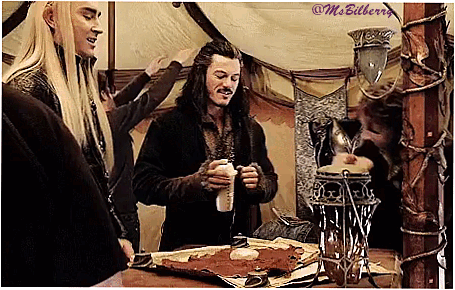
#bagginshield#ms bilberry#the hobbit#thorin oakenshield#bilbo baggins#bilbo x thorin#thilbo#thorin x bilbo#erebor#lonely mountain#thranduil#bard the bowman#botfa#hobbit#king under the mountain#arkenstone#bilbo#thorin#dwarves#elves#elven king
823 notes
·
View notes
Text
Thorin: *tries to hint transparently* You know, my Mountain is so Lonely...
Bilbo: *virgin for fifty years* What is he trying to say with this?..

#hobbit#the hobbit#bilbo#bilbo baggins#bagginshield#ihobbit#thorin#thorin oakenshield#thilbo#love#lonely mountain#bilbo x thorin#thorin x bilbo
562 notes
·
View notes
Text

“The Lonely Mountain”
The fifth of eleven new watercolours depicting places in Middle-earth and Númenor for an upcoming book.
#tolkien#tolkien art#tolkien illustration#jrr tolkien#hobbit#smaug#erebor#lonely mountain#drawing#watercolour#dragon#places in middle earth
809 notes
·
View notes
Text
Unpopular opinion incoming. I’m feeling brave right now so please nobody hate me for this.
As much as I ship Bilbo and Thorin, I actually don’t think their relationship would’ve worked out if Thorin had lived. (And I say this as a hopeless romantic.) I think it would’ve turned out like the ending of La La Land.
Their paths were just too different. Bilbo was not the type to be a royal consort, ruling over others, and Thorin was not the rural, domestic type. Bilbo had a purpose in the Shire to fulfill (adopting Frodo) and Thorin had a duty to his people for which he’d spent his entire life fighting. Bilbo would never ask Thorin to give that up and come to the Shire with him, nor would Thorin, in his right mind, force Bilbo into a role for which he was not suited - no matter how much either of them may have wanted to.
Plus what if Thorin had been exposed to the Ring for years and years while Bilbo inevitably kept it with him? Especially if they both stayed in Erebor? There’s a chance it might’ve brought back the dragon sickness and torn them apart.
I think this actually adds to the beauty and complexity and tragedy of their relationship. Opposites do attract sometimes, and they were drawn to each other’s differences as well as their core similarities. But pragmatically, it’s not very likely that a long-term relationship would’ve succeeded. If Bilbo had stayed, or if Thorin had left, there would’ve inevitably been some resentment on either side, especially considering Thorin’s pride.
And the fact is I think they loved each other too much to ever demand that either of them give up his core identity for anything, even a relationship.
#bagginshield#the hobbit#lotr#tolkien legendarium#bilbo x thorin#thorin x bilbo#jrr tolkien#lotr ships#erebor#the shire#king under the mountain#frodo baggins#the one ring#dragon sickness#lonely mountain#the hobbit book#bilbo baggins#thorin oakenshield
197 notes
·
View notes
Text

Summer Adventures
Program used: Autodesk Sketchbook
#my art#digital painting#moomin#moomins#moominvalley#moomin fanart#moominvalley 2019#snufkin#moomintroll#snufmin#lonely mountain#antibeachballsociety
207 notes
·
View notes
Text

Fear! Fire! Foes! by John Howe
243 notes
·
View notes
Text
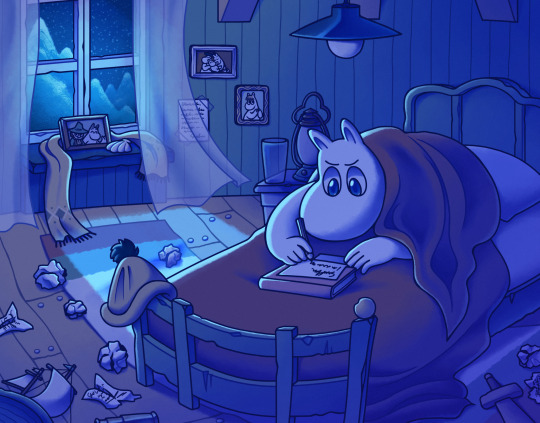
"Maybe I'll write you a letter. When I do that, it feels like you're there with me somehow..."
483 notes
·
View notes
Text
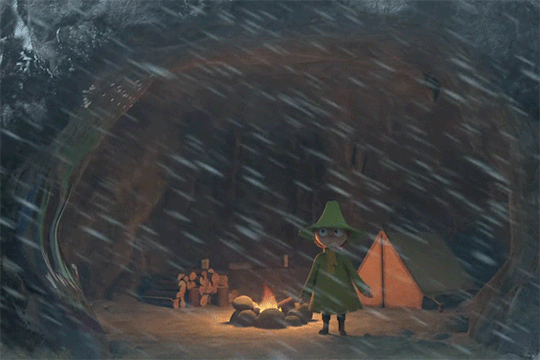
#moominvalley#muumilaakso#mumindalen#moomin#tove jansson#snufkin#winter#snow#snowing#camping#animation#gifs: mine#lonely mountain
245 notes
·
View notes
Text
I'm not sure if this has been talked about before, but I'm gonna talk about it regardless because it has completely blown my mind. I first discovered it on a reddit post, which you can read here.
In the book The History of the Hobbit, John Rateliff suggests that the Wilderlands of The Hobbit is actually the Beleriand of Tolkien's early mythology as it was written during the 1930's, only taking place ages after the War of the Jewels, since the later ages and maps of middleearth hadn't been created by Tolkien yet. Keep in mind that at this point in Tolkien's writings, the breaking of Thangorodrim was nowhere near as bad as it would later turn out to be. Beleriand never sank into the sea, but it was still drastically changed.
Here are two maps drawn by Tolkien during the 1930's, one of Beleriand and the other of the Wilderlands found in the Hobbit:
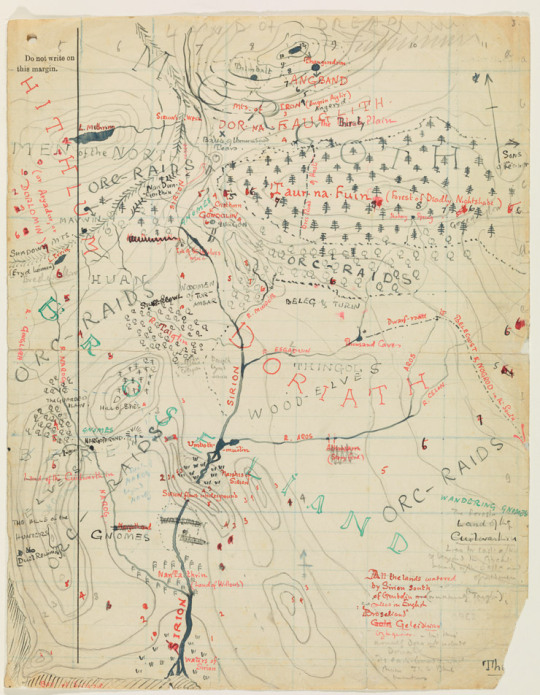
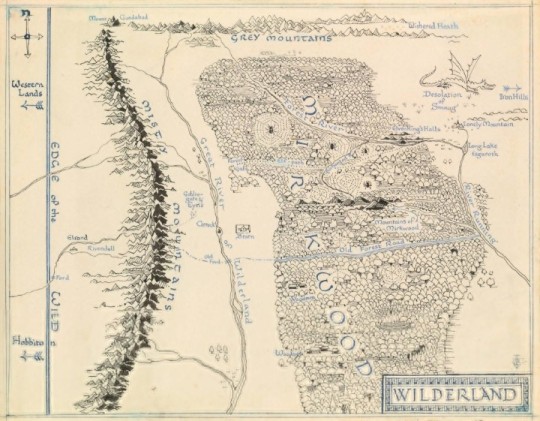
In terms of similarities, one of the first things I noticed(and one of the most obvious) was the river Sirion and the Great River of the Wilderlands. The name Sirion literally translates to 'Great River'.
In the middle of the path of said river is the Carrock, which is where the Eagles set Bilbo and Company down after saving them, and the way it is described in the Hobbit reminds me a lot of this illustration Tolkien made of Tol-Sirion:
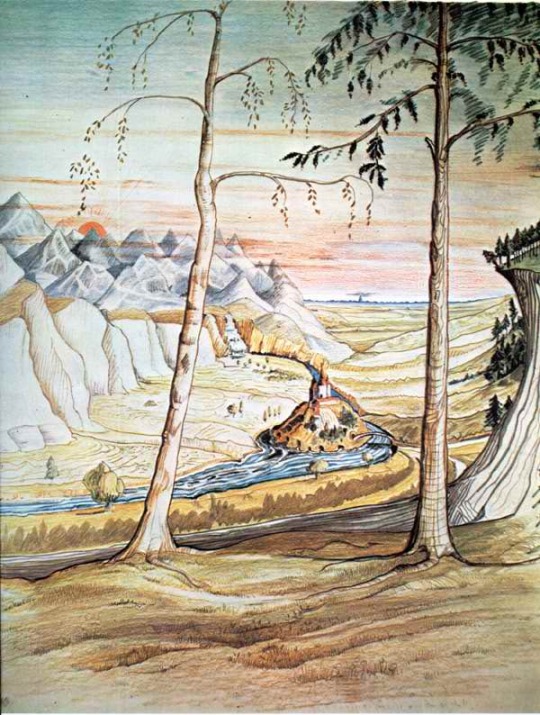
"But cropping out of the ground, right in the path of the stream which looped itself about it, was a great rock, almost a hill of stone, like a last outpost of the distant mountains, or a huge piece cast miles into the plain by some giant among giants."
-The Hobbit, Queer Lodgings.
AND it is also uses very similar wording to how the Lay of Leithian describes Tol-Sirion(Tolkien was working on the Leithian around the same time he was writing The Hobbit):
'An isled hill there stood alone/ amid the valley, like a stone/rolled from the distant mountains vast/when giants in tumult hurtled past'
-Lay of Leithian.
There's also the mention of "a little cave, (a wholesome one with a pebbly floor) at the foot of the steps" which the person in the reddit post suggests could be the remains of the very same dungeon where Finrod, Beren, and their companions were imprisoned by Sauron after their disguises were stripped away. The same place where all but one of them were slowly devoured one by one. The same place where Finrod died.
Above it at the top of the Carrock would be where Finrod was buried, and the "Ford of huge flat stones [that] led to the grass-land beyond the stream" could be the remains of the broken bridge that was destroyed by Luthien: "the hill trembled; the citadel/crumbled and all its towers fell/the rocks yawned and the bridge broke/and Sirion spurned in sudden smoke."
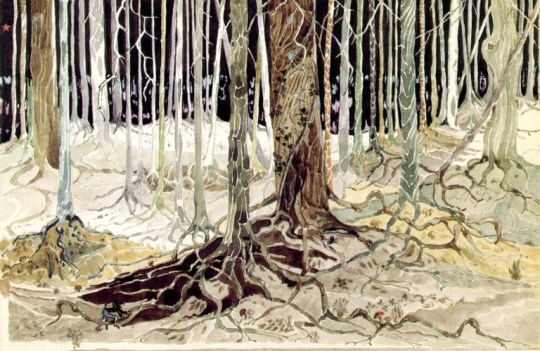
The "two Mirkwoods" is also a big one. I always found it odd that there were two completely different forests sharing the same name, but at the time Tolkien wrote it, they weren't seperate at all, but the exact same forest, just changed and grown over thousands of years in between the events of the Silmarillion and The Hobbit. The same forest that Sauron fled to after the fall of Tol-in-Guarhoth. The same one Beleg found Gwindor in after his escape from Angband.
If they really were intended to be the same forest at the time Tolkien wrote it, it also answers the question I had earlier regarding this part in the Leithian when Sauron flees Tol-in-Guarhoth:

A new stronghold? We never hear anything about this in the Silmarillion, of Sauron building a new stronghold in Taur-nu-fuin, and it puzzled me when I first read it. But that's when I realized that this "new throne and darker stronghold" was talking about none other than the fortress of Dol Guldur itself, Sauron's stronghold within Mirkwood.
(Not lying, I was pretty proud of myself for figuring that one out)
Oh, and the Lonely Mountain? While it doesnt appear on the 1930's Beleriand map, it would likely be Maedhros's fortress of Himring itself, or at least the mountain it was built on top of, as Himring is located east of Taur-nu-fuin just about in the same place where Erebor is located. Just the thought of the Dwarves' home being within the very mountain that once had Maedhros's citadel atop it has my brain going wild. (Oh, and the fact that the arkenstone was found within the ancient hills of what was once Himring, fortress of the elf lord who threw himself into a fiery chasm with a silmaril? Coincidence? I think NOT)
There are plenty of other similar locations between the two maps, and judging by them both Eriador would be Hithlum/Aryador, with the Misty Mountains being the Mountains of Shadow. The Withered Heath would be the Anfauglith, the Eagle Eyrie would be the Crissaegrim, and the Iron Hills are what's left of Nogrod and Belegost. I've even heard that Mavwin/Morwen's house could be the roots of Rivendell.
Overall, it's so, so cool and it has my mind running wild. It really makes me see The Hobbit in a whole new light. We all talk about the amazing stories that came out of the Hobbit aka Lord of the Rings, but seeing where the stories of the Hobbit came from just adds a whole other level of depth to it all. This is why I love Tolkien's works so much. It's all so incredibly deep and rich and it just gets better and richer the deeper you go, and there's so much of it. It's one of those things that you just rarely get tired of, and even if you do, you're bound to come back to it later and I love it.
#Tolkien#Silmarillion#Hobbit#Lay of Leithian#Beleriand#Wilderlands#Lotr#Erebor#Taur-nu-fuin#Mirkwood#Lonely Mountain#Sirion#Finrod#Beren#Luthien#Maedhros#Sauron#Tol-Sirion#Tol-in-Guarhoth
377 notes
·
View notes
Text
AU. Everyone is alive and living happily in Erebor. Bilbo and Tauriel plant a wonderful garden on the side of the Mountain and every day at 4 o'clock they drink tea there together.
On one of these days.
Tauriel: how funny it is now to remember how jealous Legolas was of me.
Bilbo: *takes a sip and looks into the distance* it’s possible that he was simply offended that the dwarves were interested in you, but not him.
Tauriel: well, not everyone can turn the heads of dwarves the way you and I can.
They look at each other with smiles and clink cups of tea.
***
Meanwhile somewhere in Mirkwood.
Legolas looks at the portrait of Gimli in the medallion he took from Glóin.
Legolas: one day I will find you, beautiful creature.
#bagginshield#bilbo baggins#bilbo x thorin#ms bilberry#the hobbit#thilbo#thorin oakenshield#thorin x bilbo#alternate universe#tauriel#legolas#gimli#kili#erebor#lonely mountain#mirkwood#elves#dwarves#hobbit
714 notes
·
View notes
Text
After Thorin looked at the Lonely Mountain and said ‘our home’ Bilbo never spoke of missing Bag End again.
Priorities are set.
OUR home.
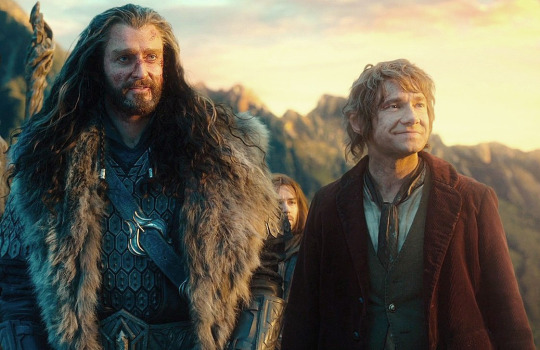
#hobbit#thorin#bilbo#thilbo#bagginshield#onelove#love#thilbo bagginshield#our home#lonely mountain#the hobbit#bilbo baggins#thorin oakenshield#ihobbit
831 notes
·
View notes
Text
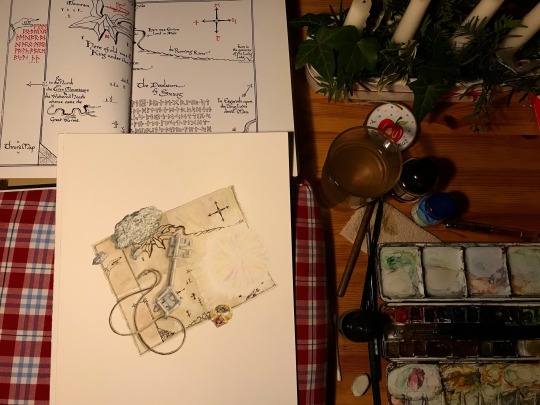
On Boxing Day 1991, I had my very first encounter with The Lord of the Rings (via the Bakshi film). Shortly afterwards, I started reading the book. The rest is history ... So what’s better than to celebrate the day with a new Tolkien watercolour?
#tolkien#jrr tolkien#tolkien art#tolkien illustration#tolkien anniversary#drawing#ink#watercolour#dwarves#thrors map#lonely mountain#hobbit
66 notes
·
View notes
Note
Back at you with the asks! You write Gimli and Legolas as distinctively representative of their own peoples, and clearly you have some pretty strong headcanons about dwarves and elves, as kindreds. What counts as "smart" and "capable" for each, and how much would your Gimli and Legolas be considered smart and capable by their respective cultures? What might each of their peoples think of Gimli's and Legolas' particular strengths? What might their relative weaknesses be, in their own contexts? How much do you consciously or unconsciously write them to balance each other's weaknesses, within or across cultures?
Ohhhhh boy wow this is an extremely delightful and, frankly, flattering question and I feel like you are maybe giving me more credit for Thinking Things Through than I have actually earned or deserve, but I am going to try to answer it in full the way such a fantastic query deserves as best I can anyway!
(the not-so-secret secret is that I write a lot more by instinct/seat-of-my-pants than I probably should shhhhhh.)
Legolas and the Wood-elves: he's everybody's little brother. He's one of (if not the) youngest elves in Mirkwood, one of the very last to be born before the Shadow (which was already creeping over the forest when he was born, although only a little bit; not enough that they had to really acknowledge it yet, even if they had sort of noticed its first unwelcome tendrils) grew so dark that they stopped risking birthing new children into their woods.
So Mirkwood (Greenwood still, then; Greenwood for a long, long time before they finally resigned themselves to the truth of the name everyone else had given them a long time ago) has always, in my head, been a very we'll be happy to spite you on purpose sort of place. Their forest is awash in darkness, so they will be joyful as a weapon against the dark. They're happy on purpose. Their merriment is a weapon. And they raised their children to be happy, dammit. Not naive, not vulnerable; they couldn't afford that. They raised them to know the dangers of their forest, and to know how to protect themselves against it, yes; but also to do so without ever giving up on joy and laughter. Which was a weapon, yes, but it was also very important to them that their children would still grow-up happy. That no matter how dark Mirkwood got, the children would never stop laughing.
Which was great, and I think informs Legolas's attitude and consistent cheerfulness during the Quest very much (of course it does, since it's being worked backwards from the canonical fact of said attitude, as an explanation for it lol)...but also, as a sort of unintended side-effect, the elves of Mirkwood didn't really want to see their youngest generation grow up, not entirely. Elves clearly have to be able to adapt to seeing someone they knew as a baby as a whole-ass adult, because they live forever (unless you kill them) so there's no just aging-out and letting the new generation eventually take over; the new generation lives alongside all the old ones too. So they'd have to have become adept at this shift in perspective, culturally.
However. The last generation of children born in Greenwood before it became Mirkwood is a special case, because their youth was such a source of joy to everyone else that they just sort of...never entirely stopped thinking of them as kids. (The fact that there hasn't yet been a generation of kids to follow them contributes to this too, of course; they're seen as The Youngsters because they still are the youngest.)
So on one hand, yes everyone has learned to respect the skills and fighting prowess of "the youngsters" because this is Mirkwood, and you aren't going to have many elves who don't go out and fight because practically everything in the forest wants to kill you a little bit. And Mirkwood values things like swift reflexes and sharp eyes and good aim, because that's how you stay alive; they value being able to judge the difference between a shadow and A Shadow at a glance because if you guess wrong "dying" is sort of the best-case result. They value loyalty and determination and the ability to be joyful even in the face of defeat and despair. And Legolas has all of those traits and skills, for sure.
In fact I think Legolas is one of their best archers (in a scene I can't remember whether I've published yet or not, his sister muses on how it might be because his spirits are so bright that his vision is yet unclouded by the Shadow that hangs heavy on the rest of them) and he's definitely trusted to, like, Walk Into The Murderforest And Come Back Alive, sure. They trust him in a fight! He's a competent adult and a skilled archer! But he's also still a kid to their eyes, in a lot of ways, even though he isn't and they know he isn't...but he still feels like one.
So it's not like they're condescending or cruel or anything, but they do I think look at him and instinctively think "oh no baby, must take care of" on some level. So: is he seen as smart and capable? Yes, for sure. But also: "omg Elrond did you really send A CHILD to MORDOR?" Elrond: he's six-hundred years old wtf. Mirkwood: "yes, a six-hundred-year-old BABY!" Elrond: .....wtf tho. So, again, it's not like his opinions or suggestions would be dismissed or ignored...but there's always going to be a bit of a protective urge there (because the elves of Mirkwood worked so hard to protect their last generation of children, and it's a hard habit to break even though they aren't children anymore) and a kind of eternal-head-pat vibe.
Also he is sheltered. (Or was, before the Quest. I expect Elrond was smart enough to try and avoid Thranduil as much as possible before he got on that boat to Aman.) I go back and forth on whether or not Rílaerloth was involved in the Battle of Five Armies, but Legolas was absolutely not brought along when Thranduil marched a bunch of their forces off to potential-war-with-the-dwarves. It's one thing to let your kids go out and shoot spiders and possibly risk a glancing encounter with a Nazgûl ("and what do we do if we see one of the Lords of Dol Guldur? That's right we run the fuck away, thank you children") and another thing altogether to bring them purposefully to something that might become a war.
Especially for the elves of Mirkwood, who lost so much in the War of the Last Alliance. None of the folks who lived through that would be keen to bring any of the "youngsters" into a full-fledged war I don't think, even a comparatively little one that they were all expecting would end up being nothing more than some Posturing With Weapons in the end. (If Thranduil had known that it was going to be an actual war he wouldn't have brought Rílaerloth, either, even if he'd have had to have Eregmegil sit on her to stop her.)
*You'll note that I haven't mentioned anything about lore or wisdom or any of the more traditional Elvish Talents here, just fighting and survival; this is tied to the whole more dangerous, less wise aspect of Mirkwood. They certainly do value wisdom and lore still, and it's not like Legolas is ignorant or an idiot; but there's a reason he forgets the words to old songs halfway through, and Aragorn doesn't. In Mirkwood they're more focused on "this is how you kill a spider before it can eat you" and "how to recognize a web that's fresh enough to be sticky versus one that's old enough to be safe to touch" and "when you feel a creeping darkness like this brushing against your soul, run like fuck" than on the things you learn in Rivendell.
In the evenings they don't gather in their peaceful Hall of Fire and exchange poetry compositions, they get drunk and dance around the fire and sing as loud as they can to scare the shadows away. They're more practical in the sort of lore they value because they have to be. They don't have a magic Ring to protect their borders; in fact, they literally have Ringwraiths and Dark Lords squatting in their own damn forest far too much of the time. Also, honestly, a lot of that lore is the history of other people anyway.
The elves of Mirkwood stayed in their forest because they wanted to; the ones who fled from Doriath and joined them there came precisely because they wanted a "simpler and more natural" elvish way of life. They weren't really involved in a lot of the Elvish Drama going on outside their woods (and when the stakes got high enough that they did get involved, three-quarters of their army died so. yeah. that's not really going to inspire them to go out and socialize more, is it?) most of the time. So if maybe Legolas can't remember the difference between Andreth and Adanel...does it matter, in Mirkwood?
(No, no it doesn't.)
Gimli and the Dwarves: I have a lot fewer Concrete Headcanons and Societal World Building done for the Lonely Mountain than I do for Mirkwood, so this is going to be very much a briefer response, I'm afraid. But I think Gimli was likely equal parts respected and overlooked by his people, because he is a very talented and erudite dwarf of a very fine line of dwarves, so on one hand everybody definitely would respect him and his capabilities...but on the other, I think they do take him for granted a little bit, because of course he would be good at x and y and also z, because he is Gimli son of Glóin of the House of Durin! And he's certainly talented—but also hasn't really done anything of great significance before the Quest, due mainly to the fact that there simply wasn't anything significant to do. So: respected, yes. But not always acknowledged, in a way.
Not given the "he's a kid!" treatment like Legolas is, but just having his competence and skill taken for granted much more often than it gets remarked upon. People expect Gimli son of Glóin of the House of Durin to be awesome (and he is!). Mind you, over-achiever that he is, he goes out and gets himself sent on this massively important Quest and then proves to be so much more awesome than anyone was prepared for...but it's not until he gets back, and the full accounting of his deeds and accolades and honors is recounted, that anyone in the Lonely Mountain really stops to go oh huh.
And I think even then, they probably still continue to take his prowess for granted a little bit, simply because they're so used to him being that way—and so used to expecting him to excel at whatever it is he's asked to do. I think the full breadth of his brilliance probably won't be properly realized and appreciated until some years later, when he's Lord of Aglarond and there's a bit more distance there, and more younger dwarves who grew-up on the stories of Gimli more than just "yeah that's Glóin's kid, he's good hand at [insert-skill-here]" running around to be in proper awe of Gimli of the Nine Walkers, Gimli Lockbearer, Gimli Elf-Friend, Gimli Lord of the Glittering Caves, Gimli Silvertongue, Gimli Friend of Kings...etc etc etc.
I think the older dwarves might actually end up a little blindsided by it, in a way, when it does sort of click in their heads.
Weaknesses & Balance: Legolas has a tendency to run-off half-cocked without thinking things through, trusting his instinct and skill to get him out of whatever he might end up running into (part of this is because of the aforementioned sheltering: yes Mirkwood is a dangerous place, but he's never really been anywhere but Mirkwood before, and the dangers of Mirkwood are dangers that he knows how to deal with so he doesn't need to worry that he's going to end up in over-his-head there). He's also definitely the short-tempered one of the pair (hello, Éomer!) although he's also the more easy-going in a lot of ways simply because there aren't a lot of things that do make his temper spike.
Gimli by contrast is more of a craftsman in his approach to the world, although not so much as to hesitate when faced with a need to act (for instance: "dwarves can't shape stone with our fingernails, but I'll come figure it out anyway!") but that's countered somewhat by his extremely overpowering sense of loyalty: if his idiot friends run into a bad situation, you can bet that Gimli will be right on their heels even if he ought to know better. He's more self-effacing, too, which can be both a good thing and a bad thing, although in his case it's mostly the former. Conversely, he's very prideful, too, although he's such a gentleman about it that you don't really notice ("I would take offense at x, if you weren't too ignorant to know better!" etc) because it's not a rude sort of arrogance; just a supreme, contended confidence both in himself and in his people.
I think Gimli wears his heart on his sleeve a lot more, although Legolas is the one who's more directly open about his own thoughts and feelings whereas Gimli is more inclined to keep things to himself. (Gimli thinks; Legolas blurts.)
Gimli certainly does share his feelings ("what about your companions! what about Legolas and me!"), sometimes trying to cover them with gruffness (see: "I was upset to think you might be dead when I found you underneath that troll, only because I'd gone to so much effort to keep you alive, you see! I definitely wasn't running around the battlefield frantically searching for you out of pure friendship and love, nope!" and "say not so! I'd be bummed if all the elves left because elves are kind of cool you know?") and sometimes dropping some full-on poetry at us (see: "I have looked the last upon that which is fairest!" as well as literally every single word about Aglarond lol) but it tends to pop out in half-involuntary bursts where he just gets so overwhelmed by how much he cares that he can't help himself.
Whereas Legolas is just like "oh yeah let me tell you about the Sea-Longing that's eating my soul from the inside out, nbd" or "sorry, can't translate these songs for you because I Am Sad." He may not walk around actively volunteering his thoughts or opinions unprompted often, but he doesn't seem to make any efforts to maintain a pretense or keep whatever he's feeling private either, when the topic comes up. He'll just walk around Singing What He Feels for the whole world to hear, why not?
And on the aforementioned topics of poetic phrasing and Not Having A Filter, Legolas is definitely The Awkward One when it comes to conversation and diplomacy. Gimli Silvertongue knows how to craft a clever phrase, thank you very much! He is eloquent and gracious and even-tempered and Legolas...well, we're all probably lucky if he's remembered to speak in Westron rather than his own weird forest dialect of Sindarin, tbh. When one of them needs to do the talking for them both, it's almost always going to be Gimli. Legolas is the guy you get when you need to shoot-down a flying Nazgûl; Gimli is the one you call when there's a delicate diplomatic situation to be discussed.
Legolas is also definitely the more easily distracted, and I think Gimli teases him about that a lot—although that's also a bit of a cover, because Gimli knows that Legolas's senses are so much sharper than his. Said distractability is in part a result of the natural flightiness of Wood-elves and in part the result of having those keen senses: he notices more things, so of course he's more likely to be distracted by them. Having said sharp senses also means Legolas can more safely afford to allow himself to be distracted, because he doesn't have to actually pay attention to notice an approaching danger the way Gimli does. (And yes, Gimli gets grumpy about that sometimes, but this is part of that "cover feelings through gruffness" thing: he doesn't want to admit that he worries that Legolas will get himself into trouble by not paying enough attention, and he definitely doesn't want to admit that dwarven senses can't keep up.)
In fact, I think post-Quest one of Gimli's biggest weaknesses is his concern that a mortal dwarf can't keep up with an elf. I think he worries about it a lot more than is merited by reality, actually, and I think that's informed in large part by his knowledge of his own mortality and how much it will eventually hurt Legolas to lose him. He cannot help but dwell on all the things a dwarf can't do that an elf can, because he's so preoccupied by the one big one: an elf can stay, while a dwarf eventually has* to leave...has to die. So while it doesn't exactly shake his sense of confidence in himself, it has him paying a lot more attention to what he can't do than what he can. He doesn't forget his strength or skills; he just ends up weighing them less than they deserve when balanced against what elves can do instead.
*he doesn't, as it turns out! but he doesn't know that yet.
(As much as he comes to dread Gimli's death, none of the rest of that has ever occurred to Legolas. If anyone asked Legolas if he ever got "tired" of being "held-back" by the "limitations of a dwarf" you'd get a very confused look in return and an apologetic explanation about how Different Types Of People Have Different Strengths, Silly...or, depending on how rudely you phrased the question, a very quick and probably painful lesson on what more dangerous and less wise can mean. Legolas doesn't really understand mortal limits—see: "are you sure you don't want to just keep running all night? why not?" and of course the infamous "gee why don't y'all just walk ON the snow? what, like it's hard?" incident—but when somebody says "No Legolas, that's Not Physically Possible" he rolls with it, even being able to later point-out to marchwardens who don't know Mortal Limits as well as he (now) does that his friends need more than a single rope to run on, pls!)
Legolas is right, though, because their different strengths really do balance one another well: Gimli is the solid, thoughtful, reliable rock who makes for both an unwavering foundation on which to build and an eloquent shield upon which the waves of the world will break and leave them both unscathed behind his kind and dauntless walls. Legolas is the swift, sharp knifeblade that darts out mercilessly from the shadows to dispatch a threat and then turns around and returns just as fleetly with armfuls of unquenched joy and laughter to brighten even the blackest, deepest night without any caution or hesitation. Legolas reminds Gimli of how much he delights in curiosity and exploration; Gimli reminds Legolas of the joy and comfort of coming home after wandering afar.
Of course they had to go to Aman together. Gimli could never have resisted following Legolas somewhere so interesting, and Legolas would never have managed such a portentous journey without Gimli there to steady him along the path.
#this was really awesome to ramble my way through thank you so much!#i definitely talked too much and thought too much and had a GREAT time doing it#sorry it took me so long; it's because i had too much fun with it whoops#lotr meta#legolas#gimli#mirkwood#greenwood#lonely mountain#erebor#aglarond#glittering caves#lotr#lotr canon#lotr headcanons#elves#dwarves#rilaerloth#thranduil#gloin#gimleaf
109 notes
·
View notes
Text

Smaug Flies Round the Mountain
J.R.R. Tolkien
#smaug flies round the mountain#j.r.r. tolkien#tolkien#jrr tolkien#smaug#lonely mountain#the hobbit#dale#town of dale#fantasy#lord of the rings#illustration#watercolor#painting
26 notes
·
View notes
Text
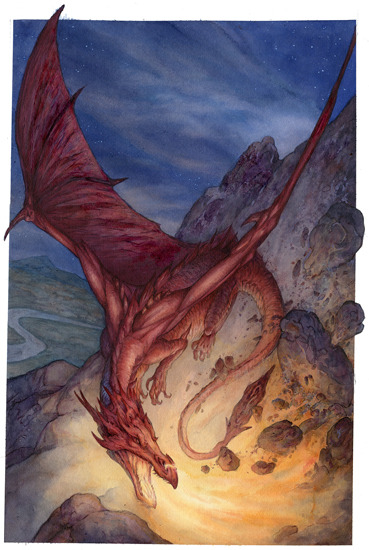
Smaug, The Destroyer
by David Wenzel
22 notes
·
View notes
Text
mandarin argument (since they split the episodes in two, this one ended on the shot of the letter on the floor, and the opening credits started after the shot of snufkin alone in the blizzard which were both pretty cool imo)
23 notes
·
View notes